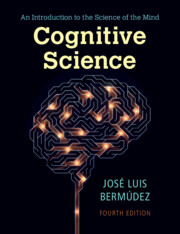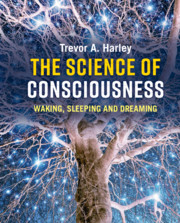The Moral Psychology of Internal Conflict
Value, Meaning, and the Enactive Mind
$41.99 (C)
- Author: Ralph D. Ellis, Clark Atlanta University, Georgia
- Date Published: August 2019
- availability: Available
- format: Paperback
- isbn: 9781108713764
$
41.99
(C)
Paperback
Other available formats:
Hardback, eBook
Looking for an examination copy?
If you are interested in the title for your course we can consider offering an examination copy. To register your interest please contact [email protected] providing details of the course you are teaching.
-
Pushing back against the potential trivialization of moral psychology that would reduce it to emotional preferences, this book takes an enactivist, self-organizational, and hermeneutic approach to internal conflict between a basic exploratory drive motivating the search for actual truth, and opposing incentives to confabulate in the interest of conformity, authoritarianism, and cognitive dissonance, which often can lead to harmful worldviews. The result is a new possibility that ethical beliefs can have truth value and are not merely a result of ephemeral altruistic or cooperative feelings. It will interest moral and political psychologists, philosophers, social scientists, and all who are concerned with inner emotional conflicts driving ethical thinking beyond mere emotivism, and toward moral realism, albeit a fallibilist one requiring continual rethinking and self-reflection. It combines 'basic emotion' theories (such as Panksepp) with hermeneutic depth psychology. The result is a realist approach to moral thinking emphasizing coherence rather than foundationalist theory of knowledge.
Read more- Proposes a new approach to moral psychology that avoids the naturalistic fallacy problem, which avoids reducing ethics to emotional feelings
- Pulls together clinical and experimental psychology, including some basic neuroscience, with careful philosophical methods for ethical thinking
- Takes both an enactivist and a hermeneutical approach to the depth psychology of internal conflict around moral and social issues
Reviews & endorsements
'Ellis provides important and provocative arguments against emotivism, relativism, and nihilism. He grounds moral judgment in the desire for coherence that is part of our naturally active cognitive engagement with the world. Ellis’s innovative account of moral psychology links moral development to curiosity, the exploratory drive, the zest for living, and the love of truth. Ellis’s insights provide a thought-provoking answer to the question of 'why be moral', grounded in cutting edge research in neuropsychology.' Andrew Fiala, California State University, Fresno and Director of the Ethics Center
See more reviews'In offering a fully humanist account of our moral psychology, Ralph D. Ellis does not countenance any hint of grounding morality on what feels like the good thing to do, nor is his perspective philosophically propped up by a critique of scientific naturalism. Drawing on a lifetime of effort in many different philosophical trenches, Ellis articulates a 'psychological prolegomena' for deciding what is morally right and true without relying upon illusory foundations.' Peter Zachar, Auburn University, Montgomery
'The Moral Psychology of Internal Conflict is unique in that it takes the new and growing literature on the neurophysiology of the emotions and uses it to significantly enhance and deepen our understanding of the complexities of ethical decision making and the socially divisive debates that surround contemporary ethical concerns. Most importantly, at long last it offers an avenue for tying the best naturalistic understandings of what we are to normative considerations without falling victim to the naturalist fallacy, that is, without reducing ethics to natural or physical processes alone. This is a book that has needed writing for a very long time. Ralph D. Ellis has proven himself the perfect person to do so.' Charles W. Harvey, University of Central Arkansas
'Drawing on neuropsychological evidence, Ellis (philosophy, Clark Atlanta Univ.) attempts to derive a 'natural science' of ethics in which value is understood by motivational principles that cohere in an exploratory drive to seek truth … Carefully argued and a fitting example of how contemporary philosophy of mind is done, Ellis's book makes a strong case for what he calls a coherentist approach to moral psychology, both in terms of how a coherent value system yields universality and how such a system is affected by selective attention.' J. Orgeron, Choice
Customer reviews
Not yet reviewed
Be the first to review
Review was not posted due to profanity
×Product details
- Date Published: August 2019
- format: Paperback
- isbn: 9781108713764
- length: 246 pages
- dimensions: 229 x 152 x 14 mm
- weight: 0.38kg
- availability: Available
Table of Contents
Part I. Love of Truth and 'Moral Sentiments':
1. The paradox of the charitable terrorist
2. Can we have naturalism without the naturalistic fallacy? 3. Love of truth and 'vital lies': basic conflicting emotions in moral and political psychology
4. Moral realism, hermeneutics, and enactive epistemology: the truth 'resists us'
Part II. Truth-Seeking and the Hermeneutic Circle:
5. 'Attention must be paid!' Hermeneutics and the demand for universalization
6. The coherence of moral worldviews: beyond the privileging of nihilism
7. Kantian abstractions and the embarrassment of reason: the need for hermeneutics
8. The limits of hedonism: paradoxes of 'expanded egoism'
9. The hermeneutic process in action: fallibilism and the role of emotion in moral and political psychology.
Sorry, this resource is locked
Please register or sign in to request access. If you are having problems accessing these resources please email [email protected]
Register Sign in» Proceed
You are now leaving the Cambridge University Press website. Your eBook purchase and download will be completed by our partner www.ebooks.com. Please see the permission section of the www.ebooks.com catalogue page for details of the print & copy limits on our eBooks.
Continue ×Are you sure you want to delete your account?
This cannot be undone.
Thank you for your feedback which will help us improve our service.
If you requested a response, we will make sure to get back to you shortly.
×




